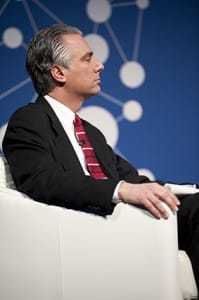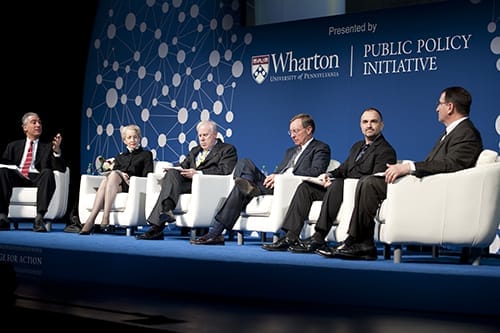Editor’s note: This week, we will post a series of blogs that highlight some of the critical business and policy issues discussed at last Thursday’s Wharton Economic Summit 2013, held at Jazz at Lincoln Center in New York City. Today’s post covers the topic of innovation.
In part the Wharton Economic Summit 2013 was a coming-out party for the Wharton Public Policy Initiative, a vigorous effort by the School to serve as a bridge between high-caliber academic knowledge, the business community and policymakers in Washington, D.C. It is apropos, then, that a good deal of the focus of the Summit’s Innovation Panel was on the role of government.
For instance, the discourse delved into innovation learning and the state of the U.S. public school system.
Perhaps the most retweeted quote of the entire Summit came from Ted Dintersmith, partner emeritus at Charles River Ventures, when he said: “The education system largely crushes the innovation out of kids.”
There is nothing wrong with the American education system, he added, except “what we teach and how we teach it.”
George Damis Yancopoulos, president of Regeneron Laboratories, pondered aloud whether the key to developing young innovators is an inspirational teacher and whether the connection could be made more “turn-key,” replicating the process in any school so that the best and brightest students are connected with educators who will encourage them.
What happens when those youngsters grow up and become entrepreneurs and inventors? Is the government in the position to assist them then?
Again, the panelists tended toward laissez faire.

Prof. Kevin Werbach
John F.W. Rogers, executive vice president at Goldman Sachs, declared that the government typically operates on two doctrines—efficiency and fairness—and they tend to work in “cross purposes.” Often, he continued, the government is not in the best position to do anything by stay out of the way of entrepreneurs.
When the government says it’s coming to help, added the financier, he says, “Please don’t.”
Dintersmith had his own theory for why government gets in the way of innovation. Bureaucrats and policymakers tend to focus on preventing failure; whereas, innovation requires risk-taking.
Yancopoulos countered that regulators do have a place. In his experience in pharmaceuticals, the Food and Drug Administration is critical to protecting patients and consumer activist groups, often from themselves. He recalled an episode when his firm was testing a drug for ALS. Consumer groups and the mass media rose up and demanded that it be fast-tracked. They believed it was a miracle drug, though full FDA-mandated testing had not been completed. In the end, the drug proved no more effective than the placebo.
“[Without the FDA], we’re going to be back to the days of the snake oil salesman,” he said.
Being a Wharton event, of course one thing attendees and panelists could agree on was Wharton’s prominent and growing role in developed entrepreneurship and innovation. As speaker Lady Barbara Judge, CW’66, chairman of the U.K. Pension Protection Fund, put it, Wharton can help young people find the entrepreneur inside them.
Wharton educators can also be entertaining. Panel moderator Kevin Werbach, associate professor of legal studies and business ethics, earned deserved kudos for guiding the discussion with humor and insight.
“Kevin Werbach leading great panel on innovation to drive our economy at Wharton Economic Summit,” attendee Andrew Heller, WG’79, live-tweeted.
On March 7, 2013, the Wharton Economic Summit convened a number of experts from across the spectrum of business and economic policy, including Wharton alumni, faculty and others, to discuss some of the most critical issues faced by business leaders today. Read more about the Summit’s panels by clicking on one of the following topics: energy, real estate or health care.


























